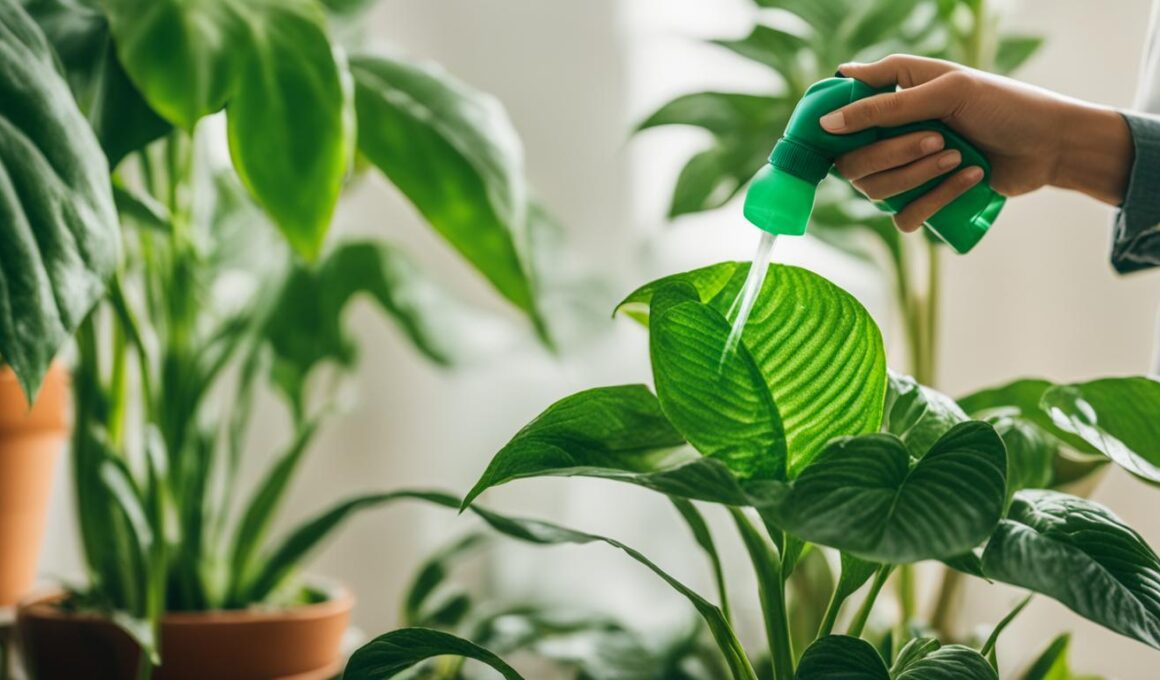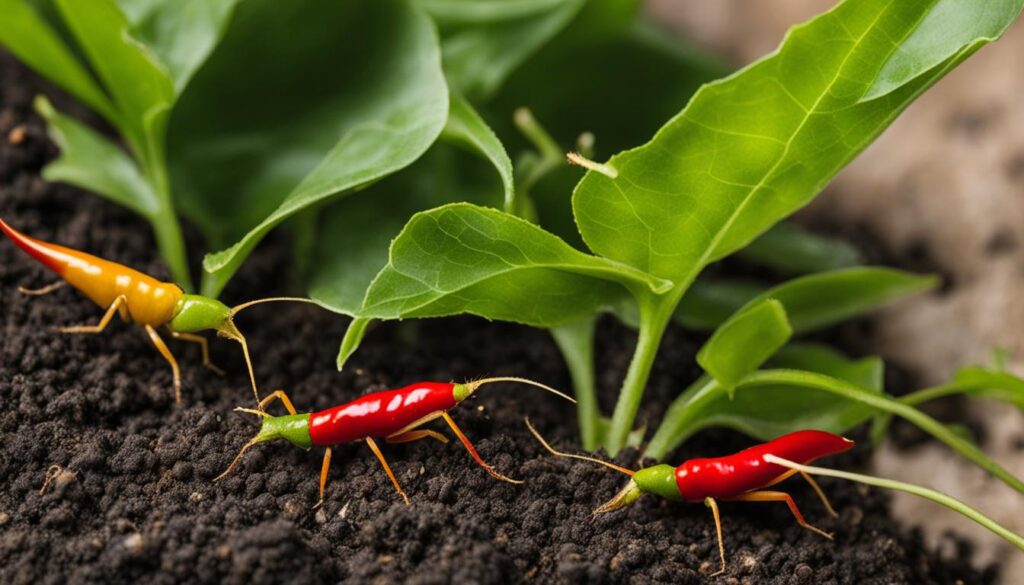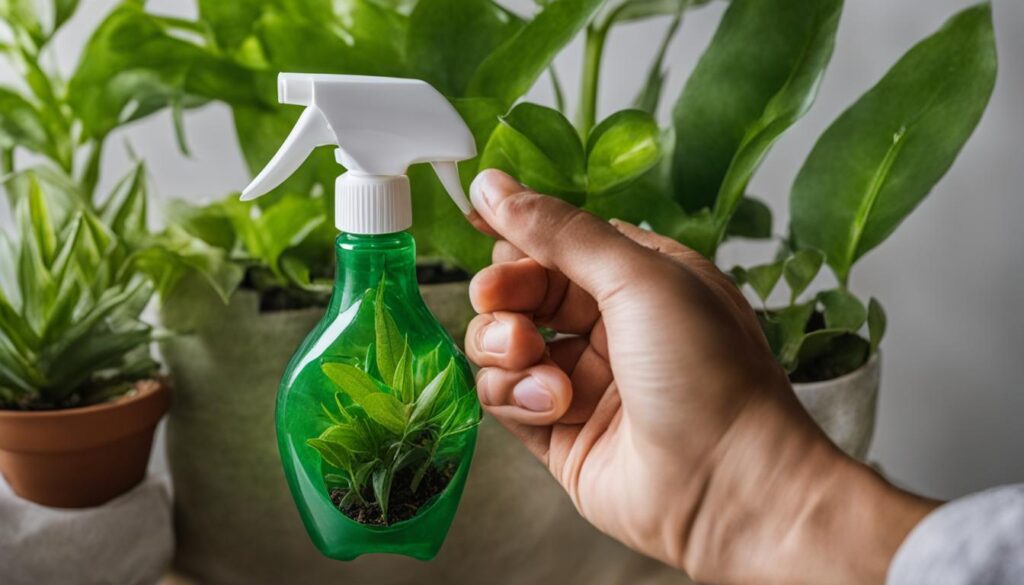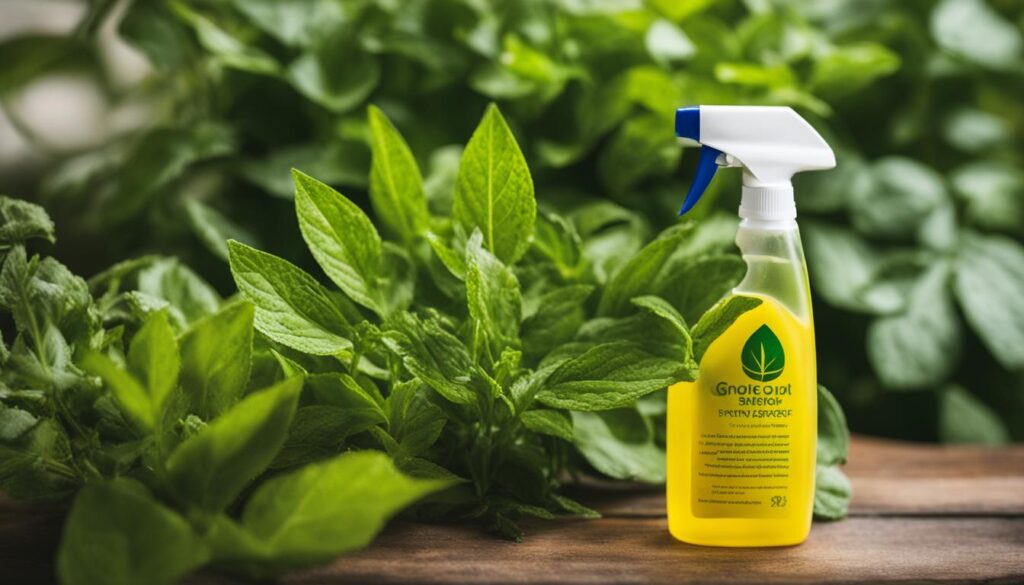Are pesky pests wreaking havoc on your precious home plants? Don’t worry, there are effective solutions that can help you protect your greens without harming the environment or resorting to harsh chemicals. By using natural and homemade alternatives, you can safeguard your plants and promote healthier growth. Let’s explore some eco-friendly options to keep your indoor and outdoor plants thriving!
Key Takeaways:
- There are natural and homemade alternatives to chemical pesticides that can protect your home plants
- Natural techniques like companion planting and barrier methods can help keep insects away from your plants
- Homemade insecticidal sprays made from soap, oil, tomato leaves, garlic, and hot peppers can tackle pests on indoor plants
- For outdoor gardens, homemade garden pesticides like vinegar spray, eucalyptus oil, neem oil spray, pepper spray, and garlic spray can deter pests
- Using natural pesticides is environmentally friendly, promotes healthier soil, and reduces the risk of pests developing resistance
Natural Ways to Keep Insects Away from Your Plants
When it comes to protecting your precious plants from pesky insects, there are natural alternatives that can effectively keep pests at bay. By incorporating organic pest control methods, you can maintain the health and vitality of your plants while minimizing the use of harmful chemicals.
Companion planting is one effective technique to naturally repel insects. By strategically planting certain herbs, flowers, or vegetables alongside your vulnerable plants, you can harness the power of nature’s own defenses. For instance, marigolds can deter aphids, while basil can repel mosquitoes and flies. This form of natural insect repellent not only adds beauty to your garden but also creates a harmonious environment that discourages pests.
In addition to companion planting, implementing barrier methods can provide an extra layer of protection for your plants. Utilizing row covers or physical barriers like collars can shield your tender transplants from insect invaders. These barriers act as a physical deterrent, preventing insects from reaching and damaging your plants.
Timing is everything
Timing your plantings smartly can also help in deterring insects. By avoiding peak insect populations, you can minimize encounters between your plants and these unwanted pests. Additionally, selecting plant varieties that are naturally resistant to certain insects can effectively reduce the risk of infestation.
- Organic pest control
- Natural insect repellent
- Companion planting
- Barrier methods
Using natural techniques like companion planting and barrier methods is not only effective in repelling insects, but it also promotes a more sustainable and eco-friendly approach to gardening. By embracing these natural methods, you can create a thriving garden that harmoniously coexists with nature.
By adopting these natural ways to keep insects away from your plants, you can protect your greens while minimizing harm to the environment, wildlife, and human health. These methods not only provide effective pest control but also contribute to the overall health and balance of your garden. So, why rely on harsh chemicals when nature has provided us with these gentle and sustainable alternatives?
Homemade Insecticidal Sprays for Indoor Plants
When natural techniques are not enough to combat pests on your indoor plants, you can turn to homemade insecticidal sprays as an effective solution. These DIY sprays are easy to make and can help you protect your greens without resorting to harsh chemicals. Here are a few homemade pest control methods that you can try:
- Soap Spray: This soap spray is made by dissolving mild liquid soap in water. It works particularly well against soft-bodied insects like aphids. Simply spray the solution directly onto the affected plants, targeting the pests and their eggs. The soap acts by disrupting the insects’ cell membranes, ultimately causing them to dehydrate and perish.
- Oil Spray: Oil spray is another effective homemade insecticide. To make this spray, combine vegetable oil with mild liquid soap. When sprayed onto plants, the oil suffocates pests such as aphids and thrips by coating their bodies and preventing them from breathing. It’s important to properly dilute the oil and soap mixture to avoid damaging your plants.
- Tomato Leaf Spray: Tomato leaf spray is a natural pesticide that can be made using soaked tomato leaves. The leaves contain alkaloids that are toxic to aphids and other chewing insects. To make the spray, soak a handful of tomato leaves in water overnight. The next day, strain the liquid and spray it onto the affected plants, ensuring thorough coverage of both the tops and bottoms of the leaves.
- Garlic Repellent Spray: Garlic repellent spray is effective at repelling a variety of pests, including aphids and cabbage worms. To make this spray, blend garlic cloves with vegetable oil and mild liquid soap, then strain the mixture and dilute it with water. Spray the solution onto the plants to create a barrier that insects will avoid.
- Hot Pepper Repellent Spray: Hot pepper repellent spray can be made using dried chili powder or fresh peppers. Blend either the powder or the peppers with water and strain the mixture. The resulting liquid can be sprayed directly onto plants to deter insects. The capsaicin found in hot peppers is what repels pests, making this spray an effective and natural pest deterrent.
These homemade insecticidal sprays provide a safe and natural way to protect your indoor plants from pests. They are environmentally friendly and can be made using common household ingredients. Remember to test the sprays on a small portion of your plants before applying them to the entire plant to ensure that there are no adverse effects. With these DIY solutions, you can safeguard your indoor plants and promote a healthy, pest-free environment.
Protect Your Plants Naturally
Using homemade insecticidal sprays for your indoor plants offers several advantages. Not only are these sprays effective at controlling pests, but they also provide a safer alternative to synthetic pesticides. By opting for homemade solutions, you reduce your exposure to harmful chemicals and minimize the risk of contaminating your home environment. Additionally, homemade sprays are more cost-effective, as you can easily make them using ingredients found in your pantry. When using these sprays, it’s important to remember that they are not completely selective, meaning that they can harm beneficial insects as well. However, by using them sparingly and only when necessary, you can strike a balance between pest control and maintaining a healthy ecosystem. So arm yourself with these homemade pest control methods and protect your indoor plants naturally!
Natural Pest Deterrents for Outdoor Gardens
When it comes to protecting your outdoor garden from pests, natural deterrents can be highly effective. Not only are these homemade garden pesticides safer for the environment, but they also help maintain the overall health of your plants. Here are some natural alternatives to chemical pesticides that you can use in your outdoor garden:
Vinegar Spray
A simple vinegar spray can work wonders when it comes to repelling garden pests. Mix equal parts of white vinegar and water in a spray bottle and apply it directly to the affected plants. The strong odor of vinegar acts as a deterrent for insects like ants, aphids, and even slugs.
Eucalyptus Oil
Eucalyptus oil is not only known for its invigorating scent but also for its pest-repellent properties. You can create an eucalyptus oil spray by mixing a few drops of eucalyptus oil with water in a spray bottle. This spray can help repel mosquitoes, ants, and even kill aphids and mites that may be harming your plants.
Neem Oil Spray
Neem oil spray is a popular choice for organic gardeners due to its effectiveness against a wide range of pests. Neem oil is derived from the seeds of the neem tree and acts as a natural insecticide. Dilute neem oil according to the instructions on the product label and apply it to your plants to control pests like aphids, whiteflies, and spider mites. Neem oil spray can also help treat other common garden diseases.
Pepper Spray
Using the power of spicy peppers, you can create a natural pepper spray to deter pests in your garden. Simply mix cayenne pepper or paprika with water in a spray bottle and apply it to your plants. The strong scent of the peppers repels spider mites, aphids, and even deer.
Garlic Spray
Garlic spray is another effective homemade garden pesticide that can ward off a variety of pests. Crush several cloves of garlic and mix them with water in a spray bottle. Let the mixture sit for a few days before applying it to your plants. The strong aroma of garlic acts as a natural repellent against insects.
By using these natural pest deterrents in your outdoor garden, you can protect your plants from pests while avoiding the use of harsh chemicals. Not only will you enjoy a healthier garden, but you’ll also contribute to a safer and more sustainable environment.
Benefits of Using Natural Pesticides
When it comes to pest control for your plants, choosing natural alternatives offers a host of benefits. Not only are natural pesticides environmentally friendly, but they also provide safer alternatives to synthetic pesticides that can harm both the ecosystem and human health. By opting for natural pest control methods, you can ensure that your gardening practices align with your goal of preserving the environment and creating a safer space for your family.
One significant advantage of using natural pesticides is the positive impact they have on soil quality. Unlike synthetic pesticides, which can deplete soil nutrients and disrupt the delicate balance of beneficial organisms, natural pesticides nourish the soil and promote overall plant growth. This means that not only are you effectively controlling pests, but you are also creating a healthier and more productive garden ecosystem.
An important consideration when using pesticides is the long-term effects of their use. Synthetic pesticides often lead to pest resistance, requiring the use of stronger chemicals over time. In contrast, pests are less likely to develop resistance to natural pesticides, allowing for their long-term use without the need for escalating measures. By adopting natural pest control methods, you can maintain a sustainable approach to gardening while effectively managing pests in the long run.
Choosing natural pesticides over synthetic ones ensures a healthier environment, promotes better soil quality, and provides a safer alternative for you and your family. Plus, with natural pesticides, you can enjoy the benefits of long-term pest control without the need to constantly escalate the strength of the chemicals used.
So, whether you’re an avid gardener or just starting out, consider incorporating natural pesticides into your plant care routine. By doing so, you not only protect your plants from pests but also contribute to a greener and more sustainable future.
Conclusion
By opting for natural pest control methods and homemade insecticidal sprays, you can effectively protect your home plants from pests without resorting to harsh chemicals. These natural alternatives not only safeguard your greens but also promote a healthier environment for everyone.
Using natural pesticides is an eco-friendly choice, reducing your carbon footprint and minimizing harm to ecosystems. It also ensures safer produce for consumption, benefiting your family’s health. Additionally, natural pest control methods improve soil quality and support overall plant growth, creating a thriving garden ecosystem.
With these effective home plant pesticides, you can enjoy the beauty of thriving indoor and outdoor plants while minimizing harm to the environment. Embrace the power of natural pest control and cultivate a safe space for your family and a sustainable future for your plants.
Can I Use Soap Spray as a Pesticide for Outdoor Plants as Well?
Yes, you can use natural soap spray for plants as a pesticide for outdoor plants. It is an effective and eco-friendly way to control pests like mites, aphids, and beetles without harming the plants. Simply mix the soap with water and spray it on the infested plants for best results.
FAQ
Are natural pesticides safe for the environment?
Yes, natural pesticides are environmentally friendly and have a minimal impact on ecosystems.
Are natural pesticides safer for human health?
Yes, using natural pesticides is safer for human health compared to synthetic chemicals.
Can natural pesticides improve soil quality?
Yes, natural pesticides can improve soil quality and promote overall plant growth.
Do pests develop resistance to natural pesticides?
Pests are less likely to develop resistance to natural pesticides, allowing for long-term use without the need for stronger chemicals.
How can I repel insects naturally in my garden?
You can repel insects naturally in your garden through companion planting, using barrier methods, and creating a garden ecosystem that attracts beneficial insects.
What are some homemade sprays for indoor plants?
Homemade sprays for indoor plants include dish soap spray, oil spray, tomato leaf spray, garlic repellent spray, and hot pepper repellent spray.
What are some natural pest deterrents for outdoor gardens?
Natural pest deterrents for outdoor gardens include vinegar spray, eucalyptus oil, neem oil spray, pepper spray, and garlic spray.
What are the benefits of using natural pesticides?
Using natural pesticides is environmentally friendly, safer for human health, improves soil quality, and allows for long-term use without the need for stronger chemicals.












